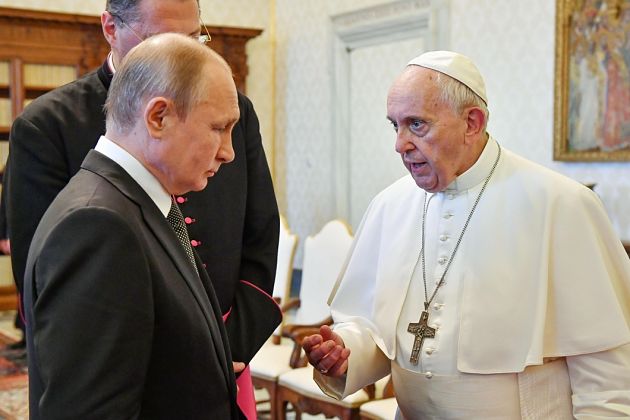There are two leaders of world faiths who have a considerable number of followers in Russia, but who are nevertheless banned from entering the country. The first is the leader of the Buddhists, the Dalai Lama. The ban on his visit to Russia is explained by diplomatic reasons – Moscow values its relations with Beijing, recognizes China’s territorial integrity and considers the Dalai Lama a threat. Although it should be noted that many countries in the world, despite Beijing’s protests, invite the Dalai Lama for informal visits, claiming that he does so unofficially as a private person and religious activist, rather than as a leader of the struggle for Tibetan independence, and that these countries, of course, recognize and respect China’s territorial integrity, and so on. This is despite the fact that these countries do not have their own indigenous peoples who practice Buddhism, such as the Kalmyks, Buryats, Tuvinians, and others in Russia, whose representatives are denied the right to see their religious leader in their own country because the Kremlin is afraid of offending China.
However, at least in this case, the Kremlin, while sacrificing the interests of Russia’s indigenous peoples, is guided by pragmatic considerations and the interests of Russia as a religiously neutral state. The same cannot be said about the second situation – the ban on the visit to Russia of the leader of the world’s Catholics, the head of the Roman Catholic Church, the Pope. Unlike the Dalai Lama, who is the leader of an unrecognized state, Tibet, challenging the integrity of China, which has occupied it (as well as East Turkestan – Uyghuristan) within its internationally recognized borders, the Pope is also the head of an internationally recognized state – the Vatican. With which Russia has diplomatic relations that do not affect the interests of any state, since neither of them claims the territory of the Vatican.
The head of this state and the leader of the world’s Catholics was recently visited by Russian President Vladimir Putin. And on the eve of this visit, rumors began to circulate once again that the head of the Russian Federation would respond by inviting the head of the Vatican to visit Russia, which would be absolutely in accordance with diplomatic protocol and elementary rules of courtesy. But no, once again these rumors turned out to be just rumors, like all similar rumors about a new restructuring, liberalization or, forgive me, “transfer”. The Assistant to the Russian President for Foreign Policy, Yuri Ushakov, explained why this turned out to be the case: “Since the Pope is not only the head of the Vatican State, but also the head of the Roman Catholic Church, this issue must be discussed especially with representatives of our Church.
So, attention. Russia, according to its Constitution, is a secular state in which religious denominations are separated from the state and are equal to each other. It cannot, in response, invite the head of an internationally recognized state with which it has diplomatic relations and which hosts its own head, because, you see, this issue should be resolved “together with representatives of our Church”.
But which one? In Russia, for example, there are about half a million Catholics and about five hundred parishes. And if the Russian Constitution is in force and religious organizations on its territory are separated from the state and are equal to each other, wouldn’t it be more logical to discuss this issue with Russian Catholics, who are supposedly full citizens of the country?
But it is clear that when the representative of the President of Russia speaks of “our Church”, he means nothing else than the ROC deputy. Which is not surprising when the Russian Foreign Ministry, in its official statements, in defiance of its own Constitution, calls Russia an “Orthodox state”.
Thus it turns out that the ROC MP, which is officially one of the religious organizations on an equal footing with other religious organizations, blocks the visit to Russia not only of the religious leader of hundreds of thousands of its citizens, but also of the head of state with whom Russia has diplomatic relations.
That is, when it comes to satisfying the religious desires of native Russian citizens – Buddhists, by inviting their leader to Russia, it is not done to avoid harming Russia’s relations with another state – China. In this case, we have a situation where Russia has official relations with the Vatican, which is not objected to by any state, and hundreds of thousands of Russian citizens who consider the Pope their religious leader are looking forward to his visit, but this is hindered by a third party – the ROC.
So, believe that Russia is a secular state where its citizens of all faiths are equal and religious organizations are separate from the state and equal to each other.

